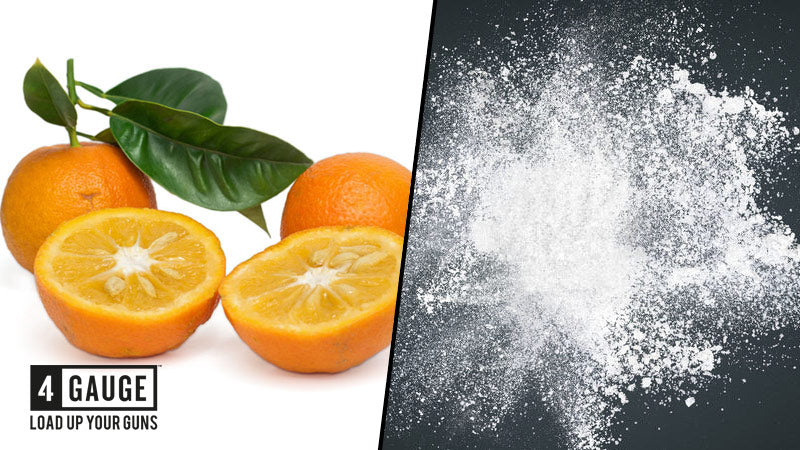
Supplements can be a mysterious thing to some. Not everyone knows every ingredient inside these products, so they don’t know which ones to avoid – or which ingredients work.
You might have experienced side effects like nausea, jitters or tingling on your skin when taking a pre workout before. But did you know exactly which ingredients caused them?
If you answered ‘No’, then you’ll learn which pre workout ingredients to avoid in this article. You’ll find out:
- 5 Worst Pre Workout Ingredients
- What Are Proprietary Blends?
- Conclusion
5 Worst Pre Workout Ingredients
As we’ve mentioned, side effects are caused by specific ingredients in some pre workout supplements. For this reason, 4 Gauge contains only 100% natural ingredients that are safe and proven to work.
But many pre workouts on the market contain potentially harmful ingredients – this increases your risk of suffering from unwanted side effects.
We’ve listed the 5 ingredients most commonly seen in pre workouts, that have been reported to cause them.
Take a look:
Beta-Alanine
This is a popular nutrient found in pre workout supplements, as it’s shown to improve muscular endurance during exercise.
However, beta-alanine can also cause a side effect called paresthesia [1].
What’s paresthesia?
This is a tingling on your skin, which can be distracting when you’re trying to focus on your gym session.
There are many other ingredients that offer the same benefit as beta-alanine, such as creatine monohydrate and caffeine – so there’s no need to suffer from paresthesia.
DMAE
This molecule is also known as ‘dimethylaminoethonol’. It’s used in some pre workout supplements as it’s believed to improve cognition – meaning it’s supposed to improve your focus in the gym.
But here’s the truth – no study has shown that DMAE actually delivers this benefit. And that isn’t even the worst part.
DMAE has been reported to be teratogenic [2].
What does teratogenic mean?
A teratogenic ingredient can cause disruptions to the development of unborn infants – meaning they can cause abnormalities (birth defects).
As DMAE is teratogenic, this is high up on our list of worst pre workout ingredients.
Synephrine
Also known as ‘Bitter Orange Peel’ or ‘citrus auranium’, this ingredient is believed to promote fat loss. It was first introduced in supplements as a replacement for ephedrine (which was banned for causing harmful side effects).
However, since then, synephrine has also been reported to cause similar side effects to ephedrine – which puts into question the safety of this ingredient [3].
Not only that, fat loss isn’t a direct benefit of taking a pre-workout; this is what fat burner supplements are designed for.
Here’s the potential side effects from taking synephrine:
- Nausea
- Dizziness
- Anxiety
2.Aminoisoheptane
Also known as ‘DMHA’, this synthetic compound is believed to be the perfect replacement for DMAA (DMAA has been reported to cause numerous side effects).
Why is 2.Aminoisoheptane used in pre workouts?
Well, it’s a stimulant that can boost your energy levels, focus, and suppress your appetite. But it’s not as good as it sounds.
Simply put, there hasn’t been a great deal of research conducted on DMHA – meaning it’s unknown whether it actually works or if it causes side effects.
For now, it’s a very unreliable ingredient and something that provides no major benefit over well researched and proven alternative, caffeine.
Artificial Sweeteners + Stevia
Many supplement companies add artificial sweeteners in their pre workouts – in an attempt to make their product taste better.
So what’s the problem?
Answer: Artificial sweeteners have been reported to cause numerous side effects [4], such as:
- Diarrhea
- Nausea
- Indigestion
- Headaches
Popular artificial sweeteners found in pre workouts include:
- Aspartame
- Sucralose
But it’s not just artificial sweeteners that cause these. Natural sweeteners are, for the most part, your best option for improving the taste of a product and avoiding side effects.
However, stevia (a plant-based sweetener) has also caused the above side effects. As a result, the FDA have refused to allow stevia to be added into foods or supplements [5].
For this reason, 4 Gauge contains 100% natural sweeteners that are proven to be safe.
Proprietary Blends
We’re adding proprietary blends into this article, as these blends are one of the biggest gimmicks in the supplements industry.
What’s a proprietary blend?
A proprietary blend is a mixture of ingredients that are shown as one overall quantity – created to a formula specific to a particular company or supplement.
This is bad, because companies are able to hide the dosages of each ingredient; they may fill their proprietary blends with cheaper ingredients that aren’t shown to work.
Not only that, as you don’t know the amount of ingredient inside these blends, your risk of experiencing side effects increases [6].
As a result, you should only consume products that have each ingredient and their exact dosages clearly listed on its ingredient list.
Conclusion
To get the best results, we recommend avoiding the ingredients listed in this article. When taking a supplement to improve your performance, you only want the best nutrients to help you – without experiencing any side effects.

4 Gauge has been extensively researched, to offer 100% natural and safe ingredients that’re proven to deliver:
- Explosive Power – Form stronger mind-muscle-connection to make the most of every rep.
- Laser Focus – Concentrate of your session without any distractions from the outside world.
- Extended Stamina – Be more productive in your workouts by performing at your peak for longer.
- Incredible Muscle Pumps – Experience skin-splitting pumps by looking thicker and tighter.
References
- Qin L. Mechanisms of itch evoked by β-alanine. J Neurosci. 2012 Oct 17; 32(42): 14532–14537.
- Melanie C. F. Perturbations in choline metabolism cause neural tube defects in mouse embryos in vitro. 2002 Apr; The FASEB Journal vol. 16 no. 6 619-621.
- Arbo M. D. Concentrations of p-synephrine in fruits and leaves of Citrus species (Rutaceae) and the acute toxicity testing of Citrus aurantium extract and p-synephrine. Food and Chemical Toxicology. 2008 Aug; Volume 46, Issue 8, Pages 2770–2775.
- Van Den Edden S. K. Aspartame ingestion and headaches. Neurology October 1994 vol. 44 no. 10 1787.
- U.S Food & Drug Administration. Is stevia an ‘FDA approved’ sweetener? Available online: http://www.fda.gov/AboutFDA/Transparency/Basics/ucm214864.htm.
- Eudy A. E. Efficacy and safety of ingredients found in preworkout supplements. American Journal of Health-System Pharmacy . 4/1/2013, Vol. 70 Issue 7, p577-588.







